General
Mak Hosts 3rd Hadithi Ya Mzizi in honour of Nshuti Balaam Kabaasa
Published
6 months agoon
By
Eve Nakyanzi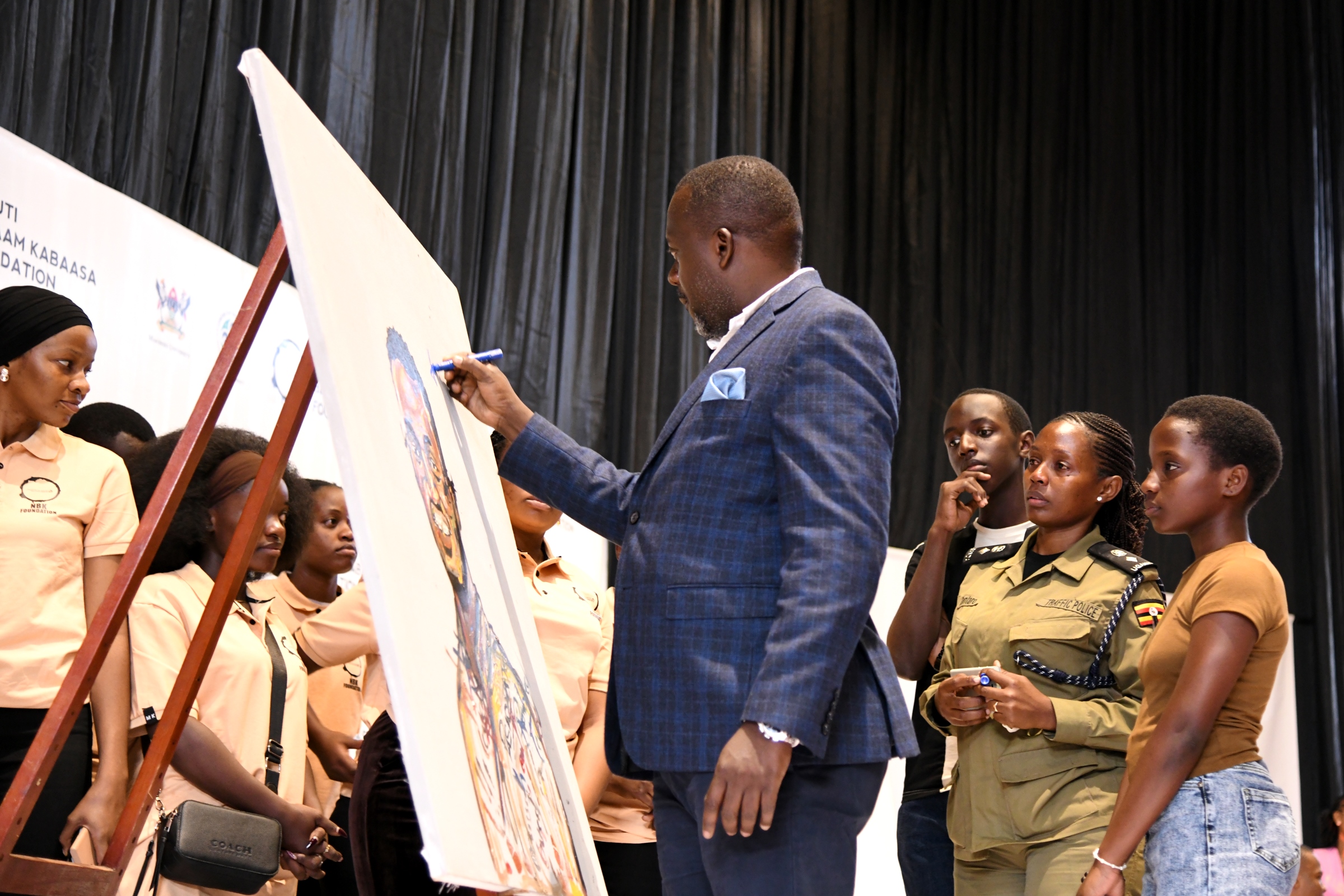
Makerere University on 29th August 2025 hosted the 3rd edition of Hadithi Ya Mzizi, an event held under the theme “Shaded Economy” at the Yusuf Lule Central Teaching Facility Auditorium. The gathering was marked by an exhibition and panel discussion, serving two main purposes: to celebrate the resilience and innovation of the informal sector through the Hadithi Ya Mzizi exhibition and to memorialize its founder, the late Nshuti Balaam Kabaasa. Balaam a final year student awaiting graduation in January 2026 passed away suddenly on 22nd June 2025.
The platform, conceived by Balaam, was designed to allow Africans to tell their own stories, inspire younger generations, and promote Pan-Africanism by celebrating Black excellence, re-centering the African experience, and encouraging youth engagement in continental and global challenges.
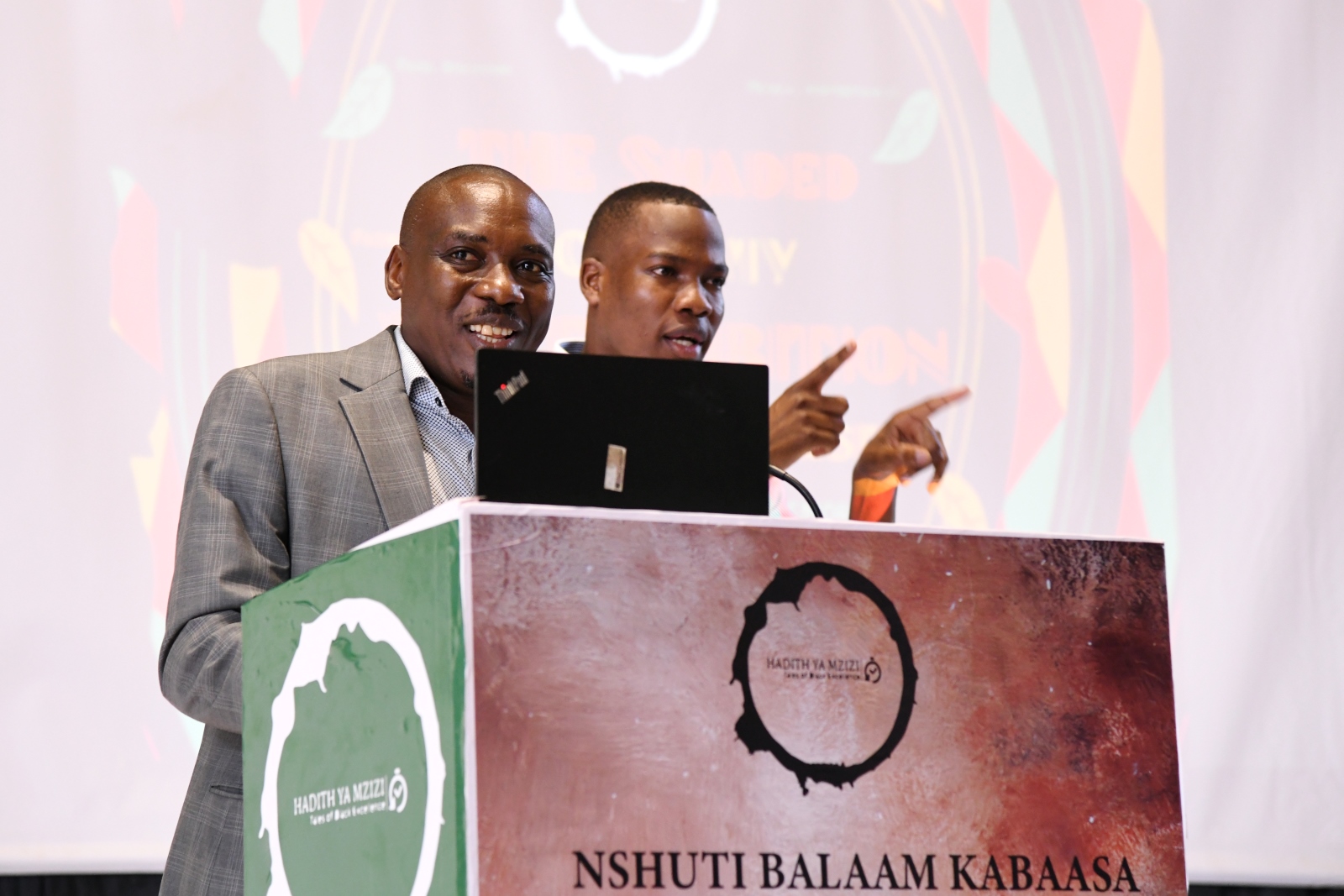
Representing the Vice Chancellor, the Acting Deputy Vice Chancellor for Finance and Administration, Prof. Winston Tumps Ireeta, described the event as a befitting gesture by the University. He noted that the exhibition was an important event utilizing art to celebrate Balaam’s life, “an individual who was an economist by profession but deeply loved art.” He pointed to the art pieces displayed outside as a reflection of his passion and thanked all funders and organizers for their support in remembering Balaam’s life. Prof. Ireeta expressed hope that the exhibition will become an annual event to ensure that Balaam’s life “is continuously remembered, as he was a nice gentleman.”
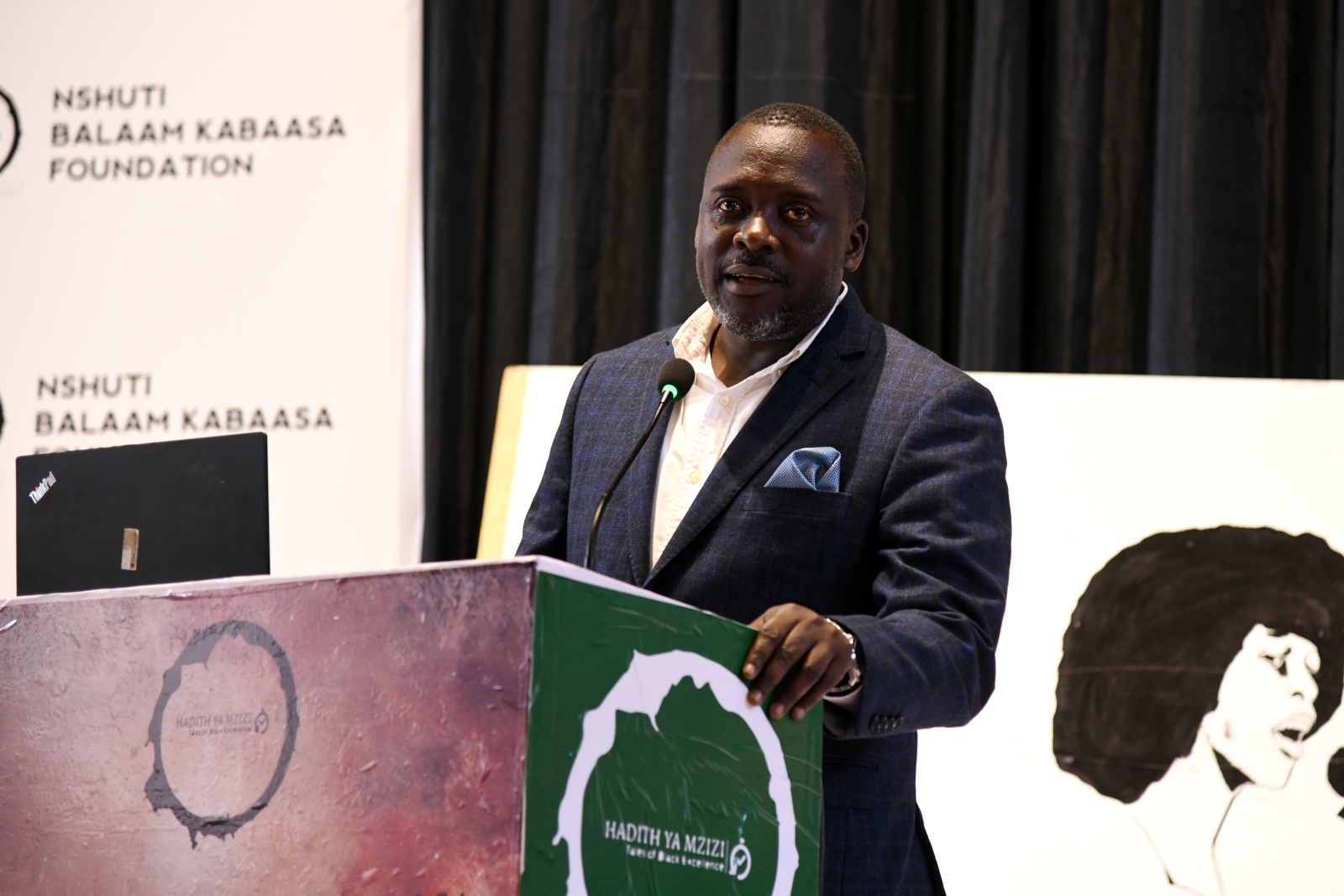
Mr. Yusuf Kiranda, the University Secretary, also spoke at the event, sharing the emotional difficulty of the day since it had only been a few months since the University lost Balaam, whom he referred to as his son. He explained the absence of some friends who were still overwhelmed by grief and prayed for strength for all members of the family and friends present. He emphasized that Balaam’s vision was to promote the connection between art and economic development, noting that “art transcends mere beauty, carrying profound messages.” He further highlighted that Balaam created a platform to help those less familiar with art to understand these deeper meanings. Mr. Kiranda, encouraged all to carry forward Balaam’s vision with confidence, emphasizing its importance “beyond a mere memory, as it addresses the necessity of a functional economy.”
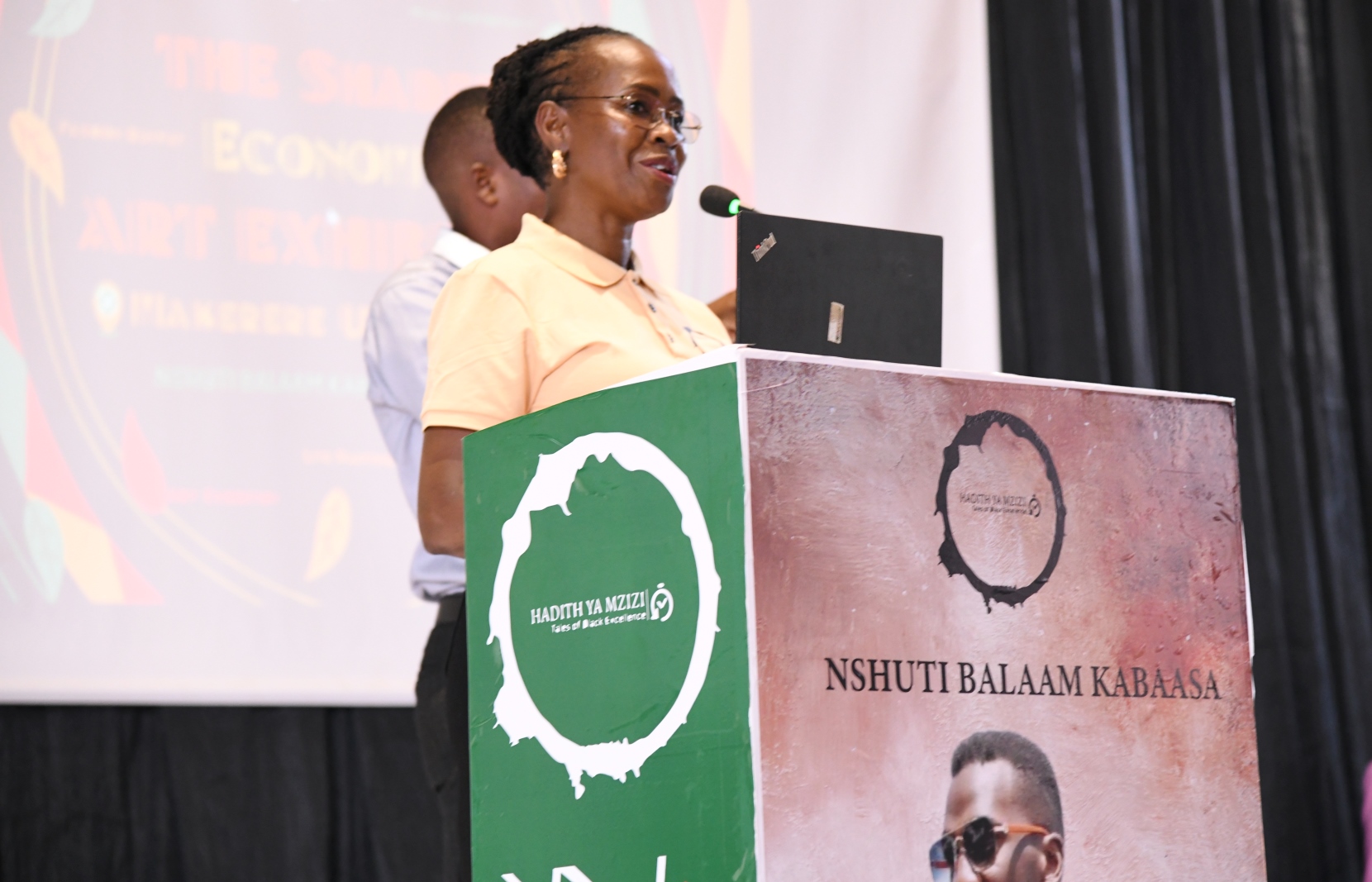
Prof. Sarah Ssali, Director of the Institute of Gender and Development Studies—whom Balaam fondly referred to as kaaka (grandmother in Runyakore)—welcomed participants to the event. She explained that Kabaasa conceived the Hadithi Ya Mzizi platform and the themes for the previous exhibitions. Hadithi Ya Mzizi, meaning “Tales of the Roots” in Kiswahili, is a Pan-African social advocacy initiative dedicated to reclaiming African narratives through creative expression. “Founder Balaam Kabaasa believed art was a tool for memory, liberation, and voice for the marginalized,” she said.
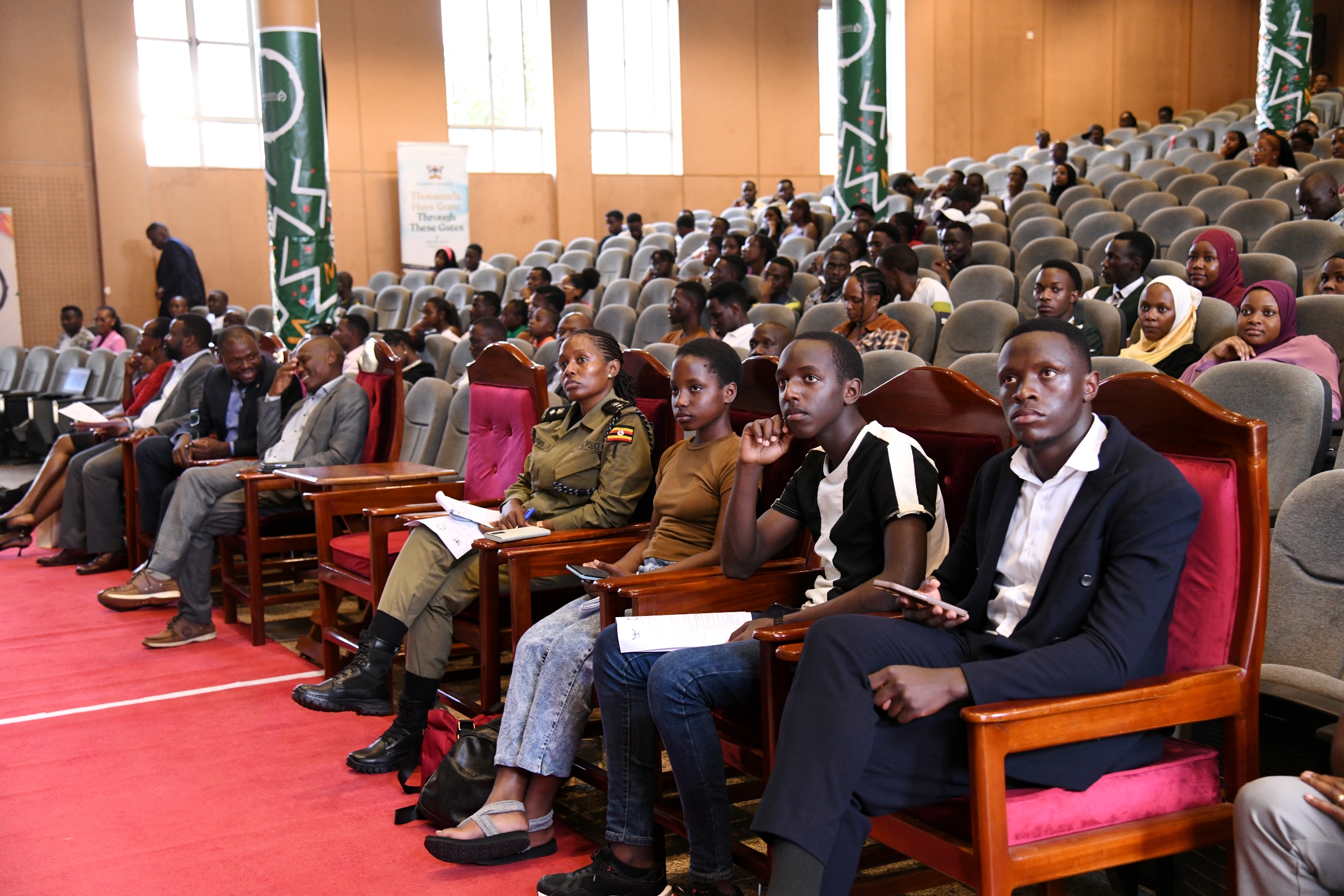
Prof. Ssali outlined the platform’s four objectives: to celebrate Black excellence, unite Pan-Africans across borders, re-center the African experience for youth, and encourage active youth engagement in addressing challenges. She also highlighted the success of the two previous exhibitions. The first, Tales of Black Excellence in the Eyes of Winnie Mandela, celebrated the end of Black History Month in 2023, paying tribute to Winnie Mandela’s life, her role in Africa’s liberation, and her influence on women’s empowerment through art and dialogue. The second exhibition, Hymns of the Nation, was a multidisciplinary showcase of visual art, music, and poetry held in 2024 that addressed themes such as domestic violence, girl-child empowerment, and community relationships.
She explained that this third exhibition, themed The Shaded Economy, celebrates the resilience of those working in the informal economy, particularly young people in the gig economy who thrive despite being excluded from formal economic metrics. Prof. Ssali thanked the event funders, including the Office of the Deputy Speaker, Makerere University’s Advancement Office, Switch Africa, and the Media Challenge Initiative (MCI).
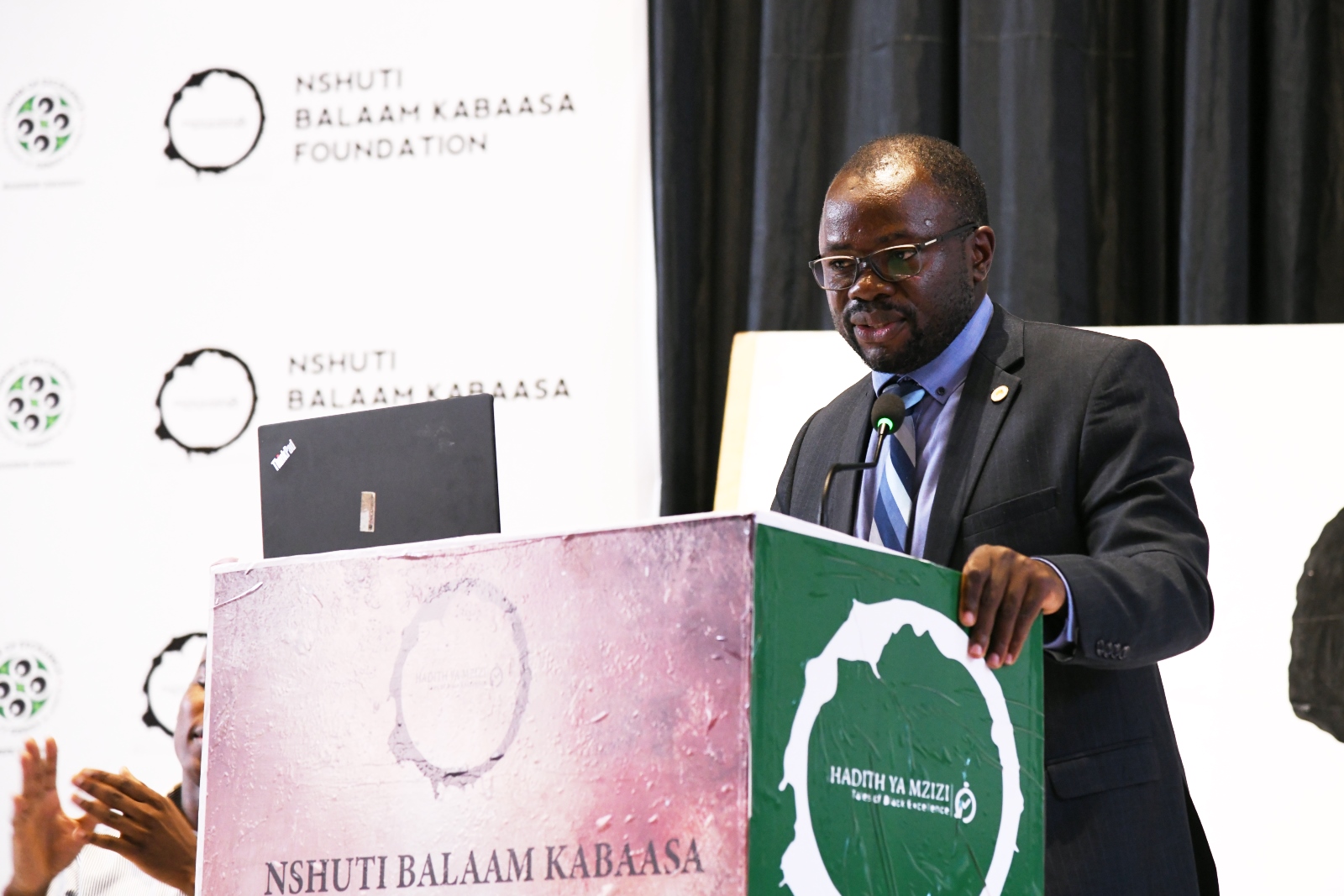
The keynote address was delivered by Prof. Ibrahim Mike Okumu, Dean of the School of Economics, who expressed delight at speaking about the shaded economy, a subject he extensively covered in his PhD research. He illustrated this economy by highlighting the resilience of young Ugandans engaged in diverse activities such as providing boda-boda rides, food delivery, graphics design, online sales, and coding. He defined it as “the livelihood and creativity existing between informal survival and formal employment,” ranging from mobile money agents and street vendors to musicians, digital freelancers, and artists. Prof. Okumu emphasized that these individuals “constitute the pulse of Uganda’s everyday economy,” and dedicated the discussion to the memory of Balaam Kabaasa.
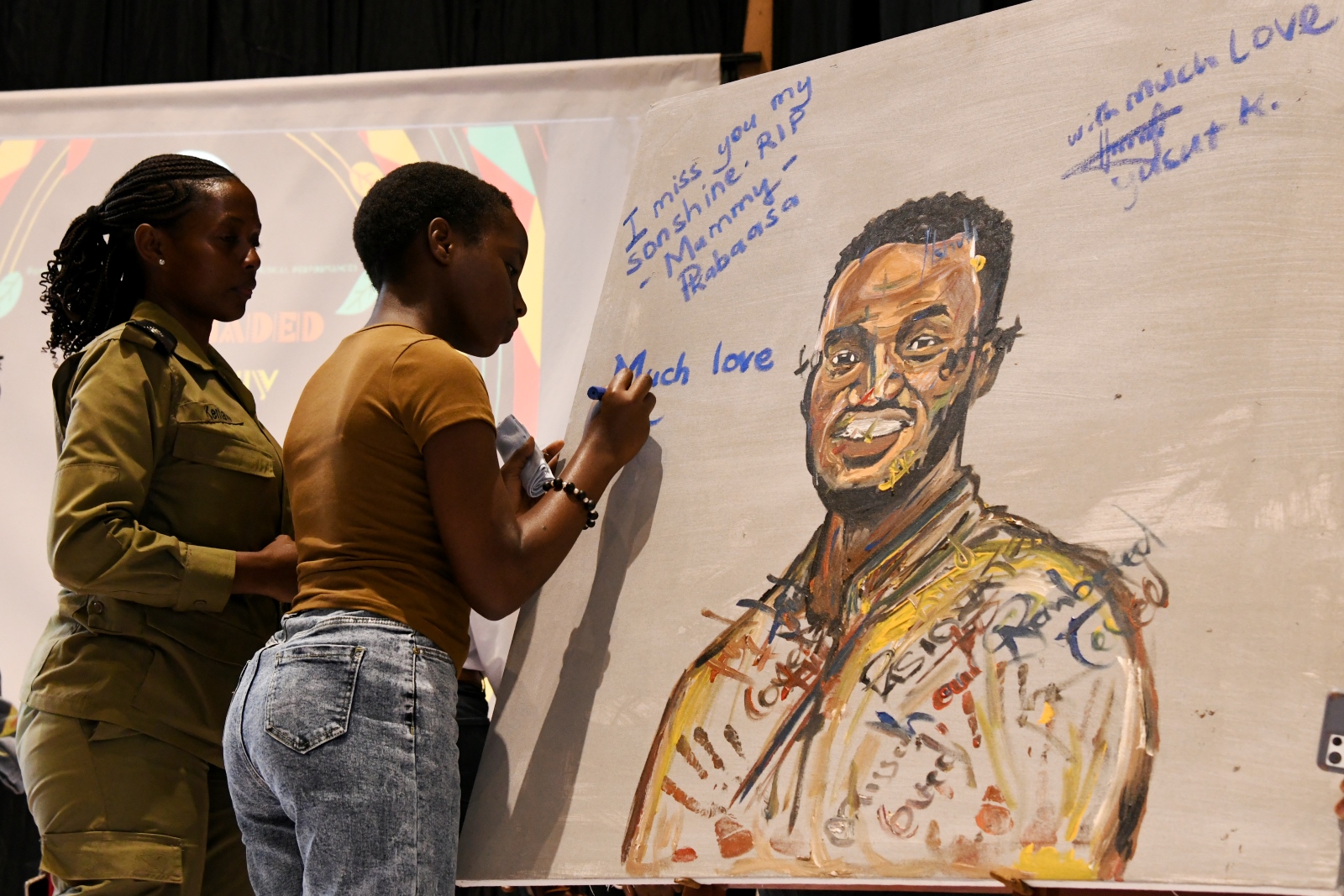
On behalf of the family his mother, Mrs. Pamela Kabaasa thanked Makerere University, the Guild leadership, Balaam’s friends, and all attendees for honoring her son. She described him as her “sonshine,” as a non-conformist who consistently chose not to follow the crowd, recalling his early passion for fine art alongside mathematics and economics. She shared memories of his entrepreneurial spirit, family devotion, and leadership ambitions. “He was full of ideas, but his strongest passion was for fine art,” she said. She also spoke of his role as a dependable “deputy parent” to his siblings, always looking out for their well-being.
A touching poem was delivered by Nicole Kabaasa in tribute to her late brother, while Steven Kiwanuka Kafeero, a friend of Balaam, also presented a poem in his memory.
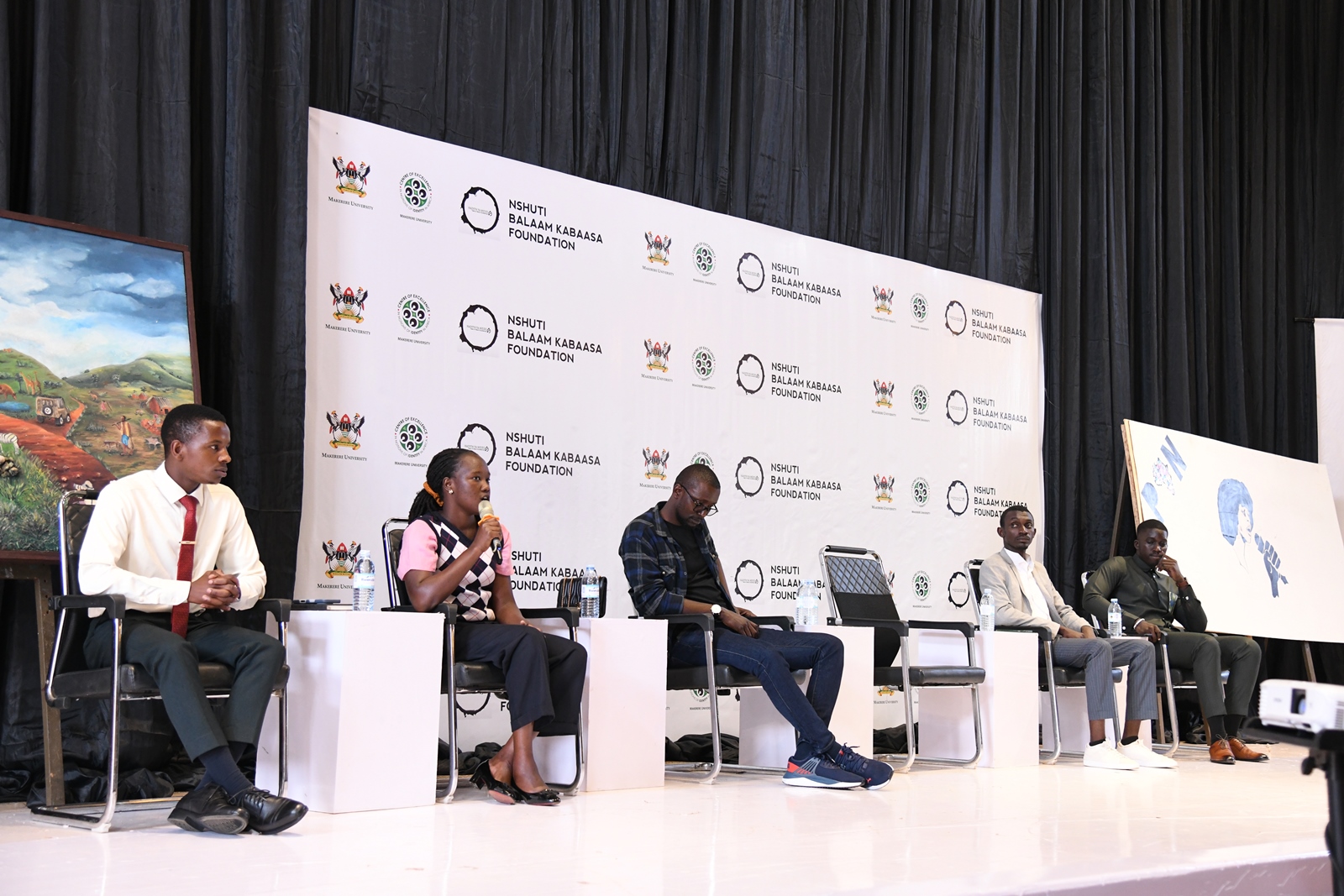
The panel discussion, moderated by Ssali Richard a third year Law Student, featured young entrepreneurs who had started informal businesses while still at university. These included Ethan Kaweesi of Mbio Za Mungu Fashion Brand, Beatrice Eyotaru, who runs a laundry business and participates in the student work scheme, Akanyihayo Joshua, who sells mattresses, Victor, who owns a perfume business, and Mr. Amos Desmond Wambi of Switch Africa.
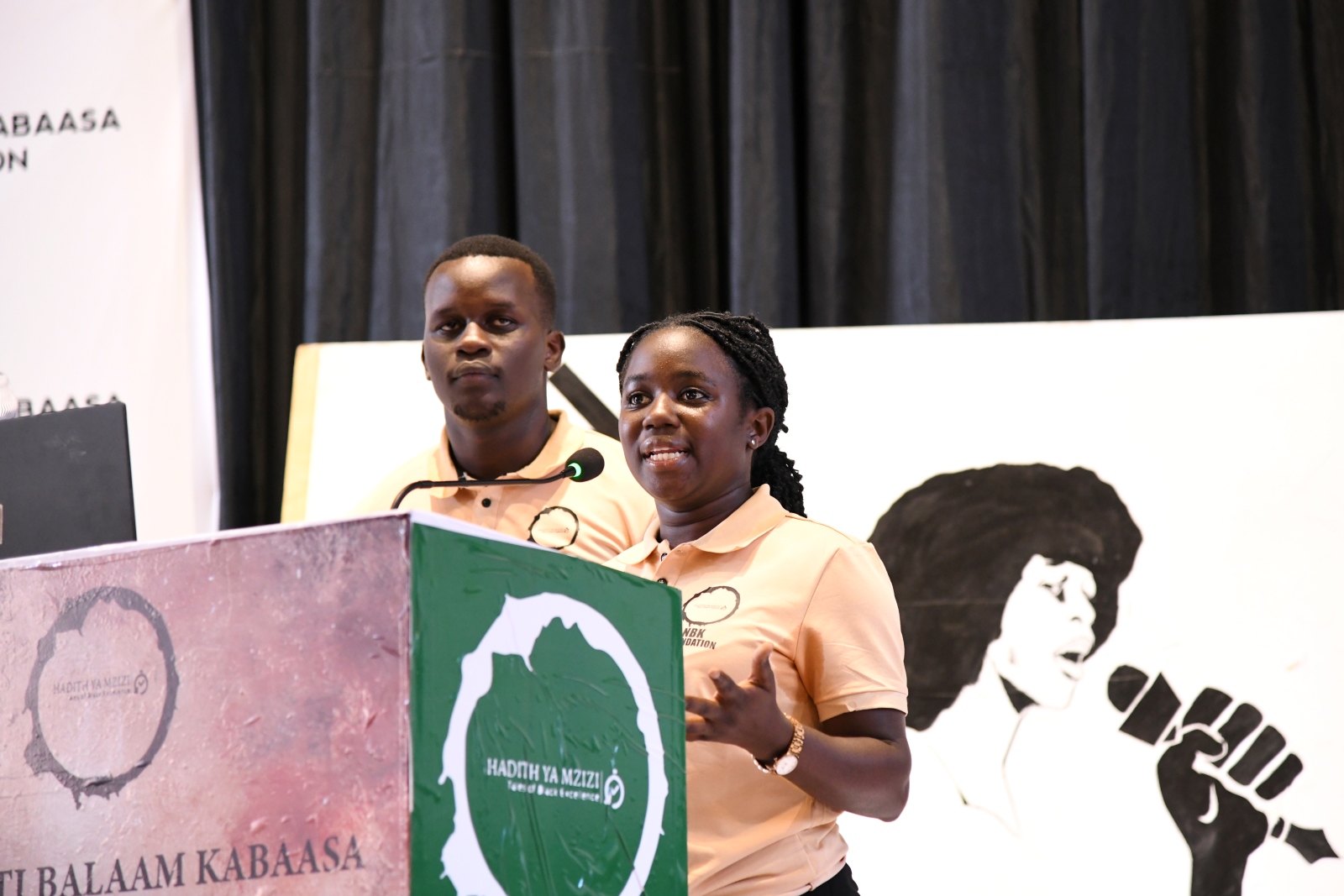
Joy Eve Serunjogi who spoke on behalf of Hadithi Ya Mzizi (Tales of the roots) explained that the initiative name symbolizes that the strength of a tree comes from its roots rather than its branches. She emphasized that the movement, founded at Makerere by Balaam, is one of art, identity, and storytelling, with a vision to reclaim African narratives and a mission to empower youth through art, dialogue, and innovation.
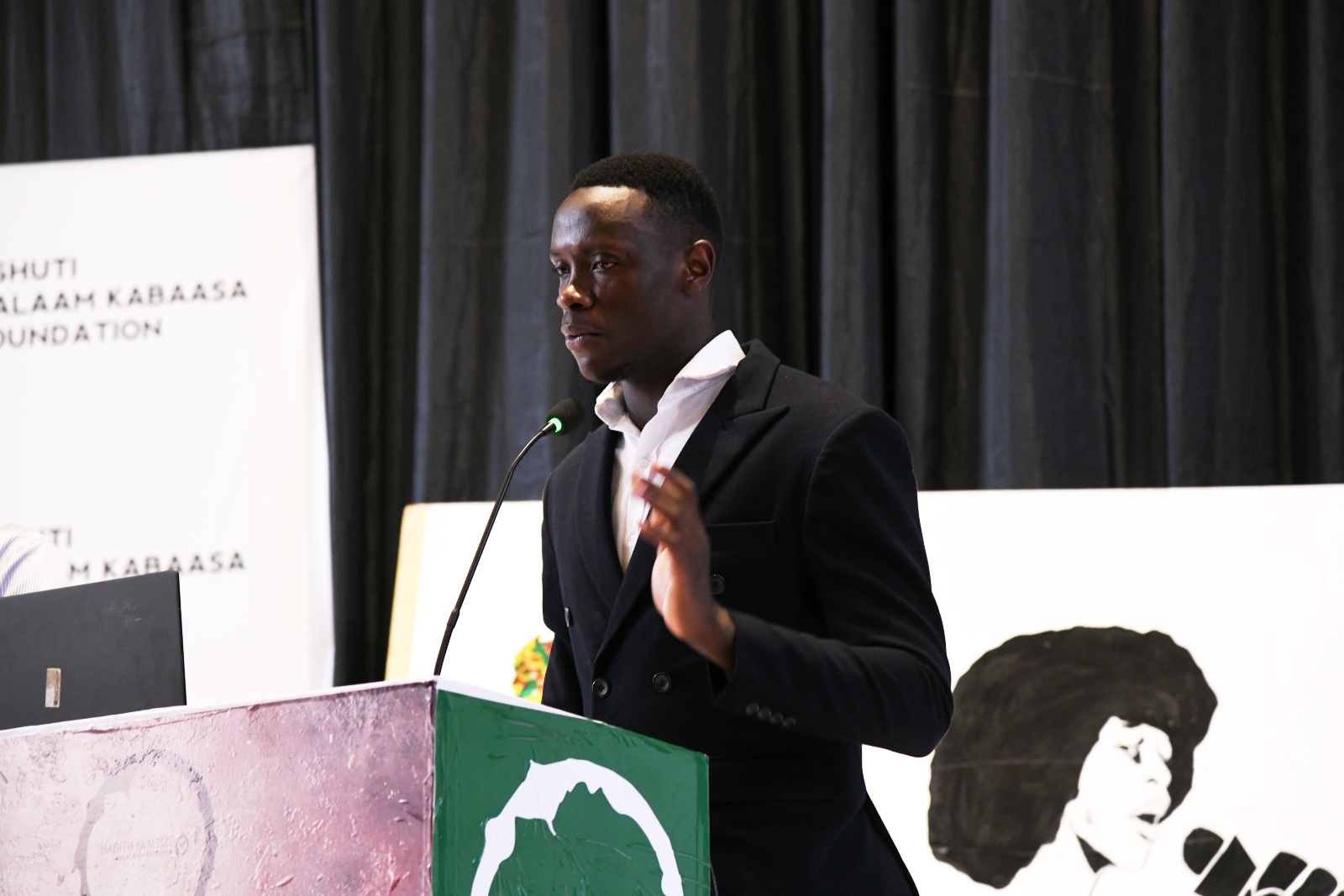
In his remarks, H.E. Ssentamu Churchill James, the Guild President, described the gathering as “a unique intersection of beauty and burden, reflection and resilience.” He observed that it not only celebrated artistry but also confronted pressing economic realities. “The event also honors the memory of a departed soul whose light continues to shine through the displayed works,” he noted. He further emphasized that “art speaks where statistics fail, effectively telling human stories, reflecting inflation, embodying struggle, and inspiring hope in ways that reports or policies rarely do.” The exhibition was dedicated to the memory of Nshuti Balaam Kabaasa, a non-conformist lover of art, brother, friend, and student whose passing left a significant void.
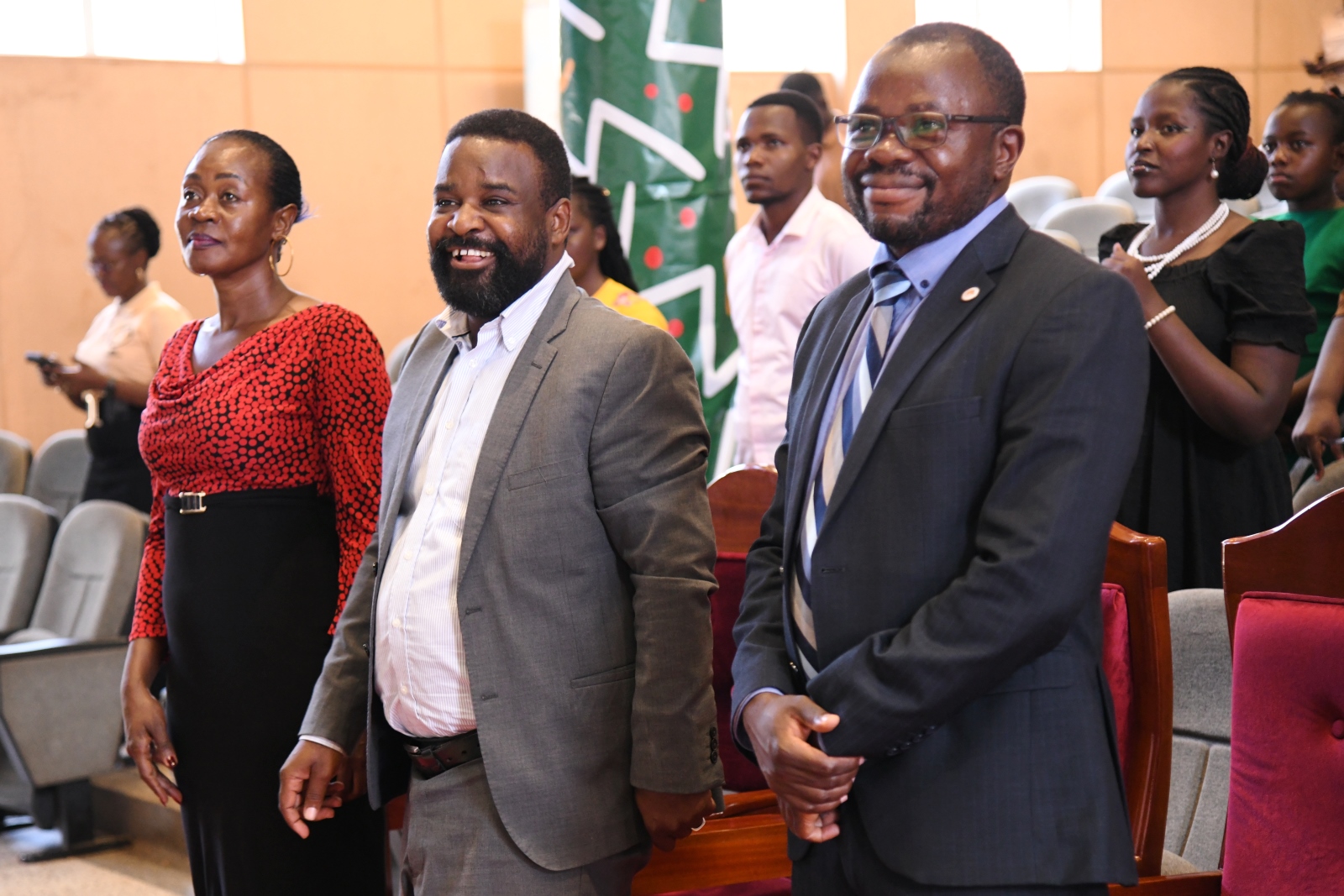
The event was attended by several Makerere University officials and friends of the late, including Prof. Wamala of the Directorate of Research, Innovation and Partnerships, Dr. Winifred Kabumbuli, Dean of Students, and H.E. Rose Nabwire, Guild President of Makerere University Business School among others.
You may like
-


Mak Selected to Host Alliance for African Partnership Africa Office
-


Meet Najjuka Whitney, The Girl Who Missed Law and Found Her Voice
-


Mak hosts First African Symposium on Natural Capital Accounting and Climate-Sensitive Macroeconomic Modelling
-


Mastercard Foundation Scholars embrace and honour their rich cultural diversity
-
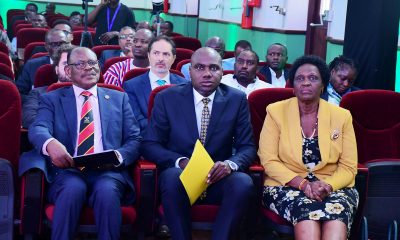

First African Symposium underscores the role of the Centre of Excellence for Africa Climate-Sensitive Macroeconomic Modelling
-


Makerere Launches Scholarly Guide, Calls for Increased Research, Publication and Innovation in Africa
General
Over 9,200 to graduate at Makerere University’s 76th Graduation
Published
13 hours agoon
February 24, 2026
Pomp and colour defined the opening day of the Makerere University’s 76th Graduation Ceremony as thousands gathered to celebrate academic excellence and new beginnings.
The historic ceremony has brought together scholars, families, friends and industry partners in a vibrant celebration of achievement and possibility. Throughout the four-day event, the University will confer degrees and award diplomas to 9,295 graduands in recognition of their dedication and hard work.
Among the graduates, 213 will receive Doctor of Philosophy (PhD) degrees, 2,503 will graduate with Master’s degrees, and 6,343 will earn Bachelor’s degrees. In addition, 206 students will graduate with postgraduate diplomas, while 30 will be awarded undergraduate diplomas.
Of the total number of graduands, 4,262 are female and 5,033 are male. According to Vice Chancellor, this marks the first time in 15 years that male graduands have outnumbered their female counterparts.
The best overall graduand in the Sciences, Esther Ziribaggwa, graduated on the opening day with the Bachelor of Agricultural and Rural Innovation and an impressive Cumulative Grade Point Average (CGPA) of 4.77.

The ceremony marks a proud moment for Makerere University as it continues to nurture top-tier professionals across diverse fields.
While presiding over the graduation, the State Minister for Primary Education, Hon. Dr. Joyce Moriku Kaducu, on behalf of the First Lady and Minister of Education and Sports, Hon. Janet Kataaha Museveni, pointed out that Makerere University is a model institution, where leaders are nurtured, scholars are sharpened, and where dreams have been given direction.
In her address, Hon. Museveni, highlighted Government’s deliberate investment in research, innovation, and infrastructure to strengthen higher education in Uganda.
“The establishment of the Makerere University Research and Innovation Fund (RIF), supports high-impact research and innovation that directly contributes to national priorities and development. Through this initiative, thousands of researchers and innovators have pursued practical, scalable solutions that are transforming communities and key sectors across Uganda,” Mrs Museveni, said.
The Minister also noted that Parliament’s approved a USD 162 million concessional loan to upgrade science, technology, and innovation infrastructure at Makerere University. The funding will facilitate the construction of modern laboratories, smart classrooms, and state-of-the-art facilities for Engineering and Health Sciences, investments expected to position the University firmly within the Fourth Industrial Revolution.
“Government has embarked on the construction of a National Stadium at Makerere University and other institutions of higher learning across the country. This will promote physical education, strengthen talent identification, and boost investment in the sports sector,”

Turning to the graduands, the Minister encouraged them to see themselves not merely as job seekers, but as job creators and solution-makers.
Uganda and Africa need innovators who will modernize agriculture; engineers who will build quality infrastructure; healthcare professionals who will strengthen health systems; and educators who will inspire the next generation,” the Honourable Minister said.
She reminded graduates that they are entering a rapidly changing world shaped by Artificial Intelligence, climate change, and shifting global markets. To thrive, she advised them to remain adaptable, creative, and committed to lifelong learning.
She also encouraged graduates interested in entrepreneurship to tap into the Government’s Parish Development Model, which provides community-based financing and production support.
Quoting Proverbs 3:5–6, the Minister urged the graduates to trust in God as they embark on their next chapter.
She extended special appreciation to the Mastercard Foundation for its 13-year partnership with Makerere University in expanding access to education and empowering young people in Uganda and beyond.
In his speech, the Chancellor of Makerere University, Dr Crispus Kiyonga, urged graduands to harness research, innovation and technology to drive Uganda’s transformation.

“This is a milestone in your lives. You have invested time, discipline and hard work to attain these qualifications. It is important that you derive value from this achievement, not only for yourselves, but for your families and for society.” Dr Kiyonga, said.
Dr. Kiyonga expressed gratitude to the Government of Uganda for its continued financial support to the University, particularly the funding allocated under MakRIF, which he described as critical in strengthening the institution’s research capacity.
“Research plays a very vital role in the development of any community. Makerere as the oldest University in the country is doing a significant amount of research, However, more work is required to mobilize additional resources to further strengthen research at the University.” Dr Kiyonga, noted.
Acknowledging the challenges of a competitive job market, Dr. Kiyonga encouraged graduates to think beyond traditional employment pathways.
“It is true that the job market may not absorb all of you immediately. But the knowledge you have acquired is empowering. You can create work for yourselves, individually or in teams.” Dr Kiyonga, said.
He advised the graduands to embrace discipline, integrity and adaptability in the workplace, and to take advantage of technology and digital platforms to innovate and respond to societal challenges.
“Every development challenge presents an opportunity. Believe that you can apply your knowledge to create solutions with impact.” He said.
Addressing the congregation, the Vice Chancellor, Prof Barnabas Nawangwe, congratulated the graduands, particularly staff and societal leaders on their respective achievements.

“I congratulate all our graduands upon reaching this milestone. In a special way I congratulate the members of staff, Ministers, and Members of Parliament that are graduating today as well as children and spouses of members of staff,” Prof Nawangwe, said.
In his speech, Prof Nawangwe, recognized outstanding PhD students, particularly members of staff. who completed their PhDs in record time without even taking leave from their duties.
He called upon graduates not to despise humble beginnings but rather reflect on the immense opportunities around them and rise to the occasion as entrepreneurs.
“You are all graduating with disciplines that are needed by society. We have equipped you with the knowledge and skills that will make you employable or create your own businesses and employ others. Do not despair if you cannot find employment. Instead, reflect on the immense opportunities around you and rise to the occasion as an entrepreneur,” Prof Nawangwe, said.
Prof Nawangwe called upon the graduands of PhDs to use their degrees to transform the African continent.
“As you leave the gates of Makerere I urge you to put to good use the knowledge you have received from one of the best universities in the World to improve yourselves, your families, your communities, your Country and humanity. Let people see you and know that you are a Makerere alumnus because of the way you carry yourself in society with dignity and integrity. Put your trust in God and honour your parents and opportunities will be opened for you,” Prof Nawangwe, said.
Delivering a key note address, Prof. Nicholas Ozor, the Executive Director of the African Technology Policy Studies Network Nairobi, Kenya ((ATPS). Reminded the graduates that a degree is not a finish line but the beginning of accountability. “The world is a complex, fast changing and deeply unequal. Degrees make you responsible for others not better than them,” Prof Ozor, said.

The 76th Graduation Ceremony of Makerere University will be held from Tuesday 24th to Friday 27th February, 2026. A total of 213 PhDs (87 female, 126 male), 2,503 Masters (1,087 female, 1,416 male), 206 Postgraduate Diplomas (80 female, 126 male), 6,343 Undergraduate Degrees (2,999 female, 3,344 male), and 30 Undergraduate Diplomas (9 female, 21 male) will be graduating from all the Colleges.
Ms. Sarah Aloyo and Ms. Nakato Dorothy both students of the Bachelor of Procurement and Supply Chain Management emerged as the best in the Humanities and Best Overall students with a CGPA of 4.93. Mr. Ssewalu Abdul, a Bachelor of Leisure and Hospitality Management student emerged second best in the Humanities with a CGPA 4.90. Ms. Esther Ziribaggwa emerged as the best student in the Sciences with a CGPA of 4.77 in the Bachelor of Agricultural and Rural Innovation, while Mr. Simon Mungudit emerged second best in the Sciences with a CGPA of 4.76 in the Bachelor of Science in Petroleum Geoscience and Production.
Commencement Speakers
- Day 1 – Prof. Nicholas Ozor, the Executive Director of the African Technology Policy Studies Network, Nairobi, Kenya
- Day 2 – Prof. Dr. Maggie Kigozi, Chairperson Makerere University Endowment Fund Board
- Day 3 – Dr. Patricia Adongo Ojangole, Managing Director, Uganda Development Bank Limited
- Day 4 – Ms. Reeta Roy, Former President & Chief Executive Officer, Mastercard Foundation
The 76th Graduation Ceremony will be held at the Freedom Square following the schedule below:
Tuesday, 24th February, 2026
College of Agricultural and Environmental Sciences (CAES)
College of Computing and Information Sciences (CoCIS)
College of Education and External Studies (CEES)
School of Law (SoL)
Livestream Link for Day 1: https://youtube.com/live/wVGPA0FJ9pU
Wednesday, 25th February, 2026
College of Health Sciences (CHS)
College of Natural Sciences (CoNAS)
College of Veterinary Medicine, Animal Resources and Bio-security (CoVAB)
School of Public Health (SPH)
Thursday, 26th February, 2026
Makerere University Business School (MUBS)
College of Business and Management Sciences (CoBAMS)
Friday, 27th February, 2026
College of Engineering, Design, Art and Technology (CEDAT)
College of Humanities and Social Sciences (CHUSS)
Institute of Gender and Development Studies (IGDS)
Makerere Institute of Social Research (MISR)
General
Mak Selected to Host Alliance for African Partnership Africa Office
Published
2 days agoon
February 23, 2026
Makerere University has been selected to host the Africa Office of the Alliance for African Partnership (AAP). The significant milestone that underscores Makerere’s role in fostering research, innovation, and global collaborations across the continent was announced at a meeting of the University’s Central Management with an AAP delegation on 23rd February 2026.
Makerere’s selection was based on the University’s robust commitment, alignment with the AAP’s Strategic Plan, and proven ability to manage consortium activities. The AAP, which was initiated by Michigan State University (MSU) in collaboration with Ten African Universities and agricultural policy research networks in 2016, targets critical challenges in education, youth empowerment, health and nutrition, agri-food systems, science and technology, water, energy, environment, and culture and society.
Addressing the delegation consisting of AAP Co-Directors from MSU, Dr. Jose Jackson-Malete and Dr. Amy Jamison, accompanied by newly-appointed Director of the AAP Africa Office, Dr. Racheal Ddungu Mugabi and Ms. Clare Cheromoi, the Vice Chancellor, Prof. Barnabas Nawangwe who appreciated the choice of Makerere to host the Africa Office said:
“One of the greatest challenges facing African universities is PhD training, particularly supervisory capacity. Through partnerships such as the Alliance for African Partnership we can leverage international expertise to strengthen supervision—whether through training supervisors or through joint supervision arrangements.”
Prof. Nawangwe equally applauded joint initiatives such as the Grant Writing and Publication project, which gave rise to the establishment of a Writing Centre that he said can be used to build capacity in AAP member universities with Makerere as the hub. Officially launched on 21st March 2023, the project is living up to its expectation of becoming a springboard for strong postdoctoral collaborative research for both institutions and other US universities.
Dr. Titus Awokuse, Vice Provost and Dean for International Studies and Programs at Michigan State University (MSU) who attended virtually, reiterated that Makerere’s selection reflects its long-standing commitment to advancing African higher education, research excellence, and meaningful global collaboration.
Reflecting on the origins of the Alliance for African Partnerships (AAP), Dr. Awokuse explained that nearly a decade ago, MSU initiated a transformative conversation in Atlanta centered on the question: How should we partner differently? From this dialogue emerged AAP—an Africa-centered consortium that now brings together 12 institutions across Africa and the United States.

He emphasized that AAP is grounded in equity, mutual benefit, shared leadership, and deep respect for African priorities and expertise. Since its founding, MSU has served as convener and key supporter, working with member institutions to strengthen research collaboration, promote faculty and student engagement, and address shared development priorities.
Dr. Awokuse underscored that AAP’s success is the result of collective vision and commitment, not the efforts of a single institution. He paid tribute to Lilongwe University of Agriculture and Natural Resources for hosting the Africa Office in its early years and acknowledged the foundational leadership of the inaugural Africa Office Director.
He described the launch of the Africa Office at Makerere University as a significant milestone that reinforces Africa-led leadership, strengthens regional collaboration, and enhances responsiveness to emerging opportunities. MSU, he affirmed, remains fully committed to AAP and to working closely with Makerere and all consortium partners to expand collaborative research, nurture the next generation of scholars, and advance Africa-led solutions to global challenges.
The newly-appointed AAP Africa Office Director, Dr. Racheal Ddungu Mugabi is a member of faculty in the Department of Development Studies, Institute of Gender and Development Studies. Her work on intersectional inequalities in Uganda and other Global South regions uniquely positions her to drive collaborative research and partnerships at the Africa Office.
Initially founded by ten African Universities and MSU, AAP now comprises eleven African members including; the African Network of Agricultural Policy Institutes (ANAPRI)-Zambia, Egerton University-Kenya, Lilongwe University of Agriculture and Natural Resources (LUANAR)-Malawi, Makerere University-Uganda, United States International University-Africa-Kenya, Universite Cheikh Anta Diop-Senegal, Universite Yambo Ouologuem de Bamako-Mali, University of Botswana-Botswana, University of Dar es Salaam-Tanzania, University of Nigeria, Nsukka-Nigeria, and the latest, University of Pretoria-South Africa.
These Universites collaborate under Focal Points to advance policy-relevant research and sustainable development. Makerere University’s Focal Point is Prof. Robert Wamala, Director of Research, Innovations and Partnerships (DRIP).
Addressing the University Management, Dr. Jackson-Malete outlined the African Futures Research Leadership Program, which nurtures early career scholars through mentorship and skill-building as one of AAP’s flagship programs. She noted that the Program that prioritizes female participants or men committed to promoting women in higher education has for the first time during its fifth cohort admitted the first male, Dr. Alfadaniels Mabingo from the Department of Performing Arts and Film, Makerere University.
The AAP Africa Office at Makerere will coordinate activities, boost research collaboration, mobilize resources, and enhance global engagements for socio-economic transformation. This aligns with Makerere‘s broader goals of leveraging international expertise to build resilient institutions.
View more photos from the event: https://flic.kr/s/aHBqjCLjoA
Trending
-

 Humanities & Social Sciences2 days ago
Humanities & Social Sciences2 days agoMeet Najjuka Whitney, The Girl Who Missed Law and Found Her Voice
-

 Health7 days ago
Health7 days agoUganda has until 2030 to end Open Defecation as Ntaro’s PhD Examines Kabale’s Progress
-

 Agriculture & Environment5 days ago
Agriculture & Environment5 days agoUganda Martyrs Namugongo Students Turn Organic Waste into Soap in an Innovative School Project on Sustainable Waste Management
-

 General7 days ago
General7 days agoMastercard Foundation Scholars embrace and honour their rich cultural diversity
-

 Health2 weeks ago
Health2 weeks agoCall for Applications: Short Course in Molecular Diagnostics March 2026
